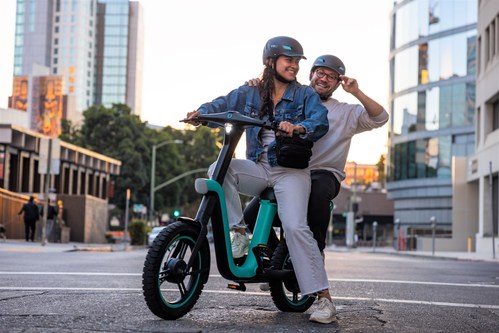Veo, the first profitable micromobility company, has created the micromobility industry’s first dual-passenger vehicle, the Apollo Class II e-bike, that can safely accommodate two riders or additional cargo storage.
Revealed today at Micromobility America, the Apollo is designed to increase ridership and reduce dependence on gas-powered vehicles by addressing two needs: the ability for two people to ride one vehicle and to transport goods utilizing a cargo storage system. The Apollo will launch in select markets in early 2023.

“As the micromobility industry continues to grow, we must expand our vehicle offerings to address unmet market demands,” said Candice Xie, co-founder and CEO of Veo. “The Apollo was developed in direct response to insights from rider surveys, feedback from municipalities, and global research that indicates the immense need for safe tandem riding and cargo hauling. By opening up micromobility to new riders and new trip types, we can reduce car dependency and help cities advance their ambitious climate goals.”
The Apollo features a throttle-assist motor, which allows riders of varying body types and abilities to get where they need to go without pedaling. The throttle provides assistance for traveling up hills or carrying cargo and offers a boost to get up to speed from a stopped position. Veo’s ridership data shows that the first-generation throttle-assist e-bike, the Cosmo-e, receives four times as many rides per day as Veo’s electric pedal-assist bikes. Once deployed, Apollo vehicles can carry two passengers or can be retrofitted to accommodate one passenger with additional cargo, depending on the needs of each market.
“If we want to get more people out of cars and into the bike lane, micromobility must accommodate rider needs for varying trip types and purposes,” said Edwin Tan, Veo co-founder and president. “A second seat and cargo-hauling capabilities make the transition to micromobility realistic for more people.”
Veo has been designing and manufacturing its vehicles in-house since 2017, which allows for continuous innovation, consistent deployment of new vehicles, and control of the entire supply chain process to ensure top quality and safety. Veo, which has a fleet of eight vehicles, including seated and standing scooters, class I and class II e-bikes, accessible wheelchair devices, and pedal bikes, continues to expand its portfolio in the more than 50 markets it serves nationwide.
“For the past five years, Veo has led innovation in the shared micromobility industry, bringing more vehicles and safety technology to market than any other company – including the industry’s first seated scooter – and we’re just getting started,” said Tan.
Apollo Specifications
- Motor – 750-watt
- Tires – 20-inches
- Max load- 400 lb. passenger weight
- Battery range – 45 miles
- Max speed – 15 mph
Veo is committed to designing and manufacturing vehicles that lead the industry in safety and user experience. Apollo safety and convenience features include:
- Simulated electric engine noise: When the throttle is engaged, the vehicle will notify pedestrians, particularly those who are blind or have visual impairments, that an e-bike is approaching with an audible noise.
- Intelligent display system: A light-up display that communicates information about the vehicle’s status (e.g., battery level, speed level, riding zone information) and displays turn signals to other road users while the vehicle is in use.
- Integrated phone holder: Holds riders’ phones for safe navigation.
- Bluetooth speaker: Syncs with smartphones so riders can hear directions or listen to music for safe routing and riding.
- Veo Voice: Veo’s newest IoT with precise geofencing and Veo Voice technology, which uses on-board speakers to explain local riding regulations.
- Veo’s proprietary swappable battery technology: Allows field technicians to swap out batteries in the field, enabling scooters to be available 24/7. Batteries are compatible with other Veo vehicle types to further enhance field operations efficiency.
About Veo
Veo is on a mission to end car dependency by making clean transportation accessible to all. We have provided millions of shared bike and scooter rides in 50+ cities and universities across North America and counting.
Veo operates from a set of values that distinguish us in the industry. We are grounded in financial responsibility: Veo partnered with select cities to achieve profitability before scaling. Our in-house design and manufacturing process enables us to constantly innovate and provide cities with the next generation of shared electric bikes and scooters. We develop collaborative, long-term partnerships with cities and universities so we can work together toward a sustainable, safe, and equitable transportation future.